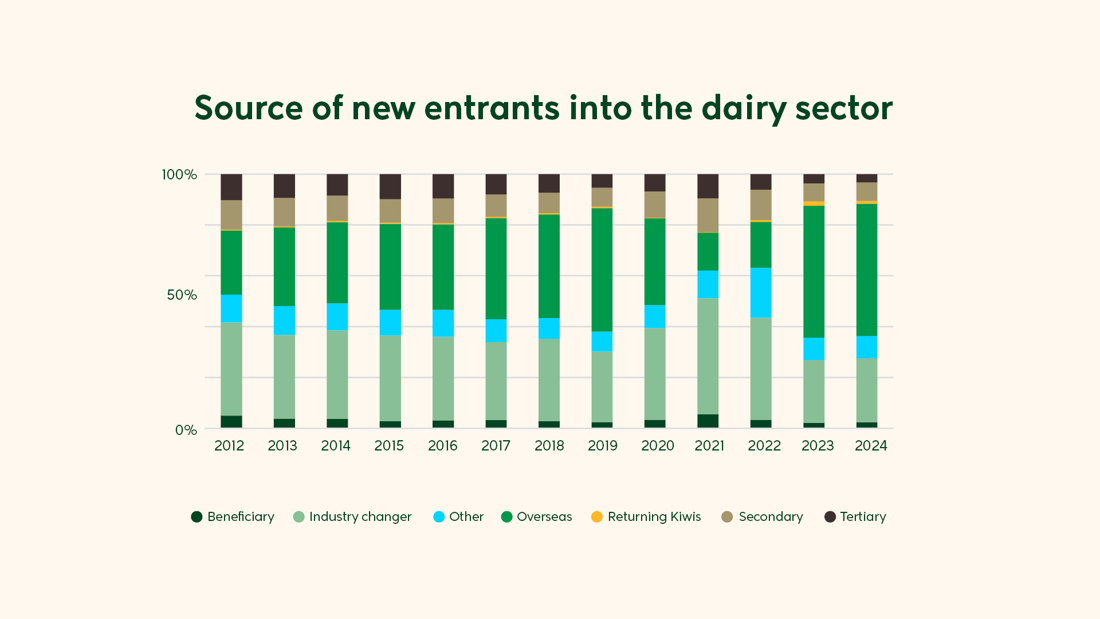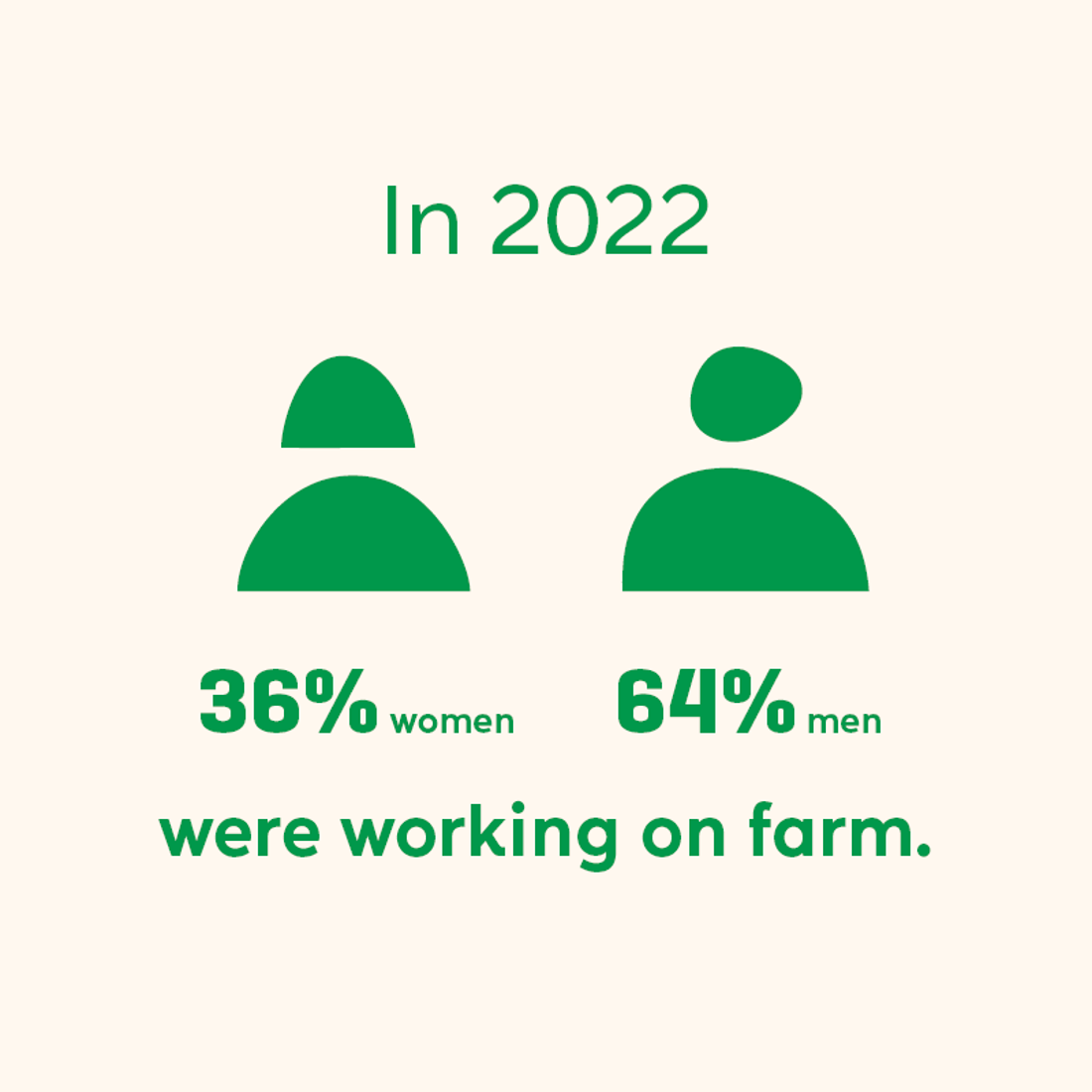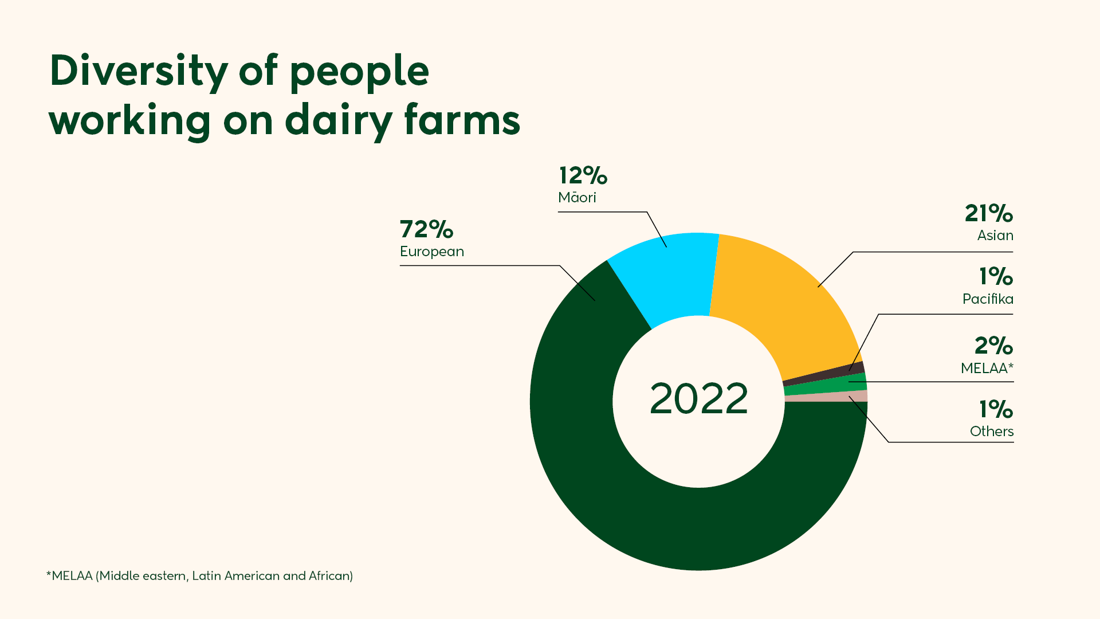Attracting people to dairy
6 min read
We want more people to see dairy as a great career – on farm, in agribusiness, and in science. To make that happen, we work alongside farmers and our Great Futures in Dairying partners to raise awareness and create opportunities. The biggest impact farmers can have is by offering great jobs in great workplaces where people want to stay and grow.
The dairy sector employs around 54,000 people or 1.8% of New Zealand’s working population. Of these, around 41,000 are on-farm; 24,000 as employees, 15,000 as employers and 1,800 are self-employed. Approximately 3,000 additional people are employed to help over calving each year. There are around 13,000 people involved in core dairy processing/manufacturing and around 1,000 people in roles strongly connected to dairy, such as vets and fertiliser reps.
People enter on-farm work with varying ages, backgrounds, and experience levels. This diversity is one of the things that makes dairy such a great place to work.

It’s important the dairy sector has a presence at different entry points into the sector and work together with other organisation to maximise our impact and effectiveness.
We encourage dairy farmers to get involved with Open Days, either Open Farms and or Pāmu Open Farm Days, to provide work experience, engage with their local schools, share their stories and support online platforms which enable people to understand life on farm and think about working in our sector.
At the school level, the dairy sector focuses on giving children and youth a broad appreciation of career opportunities across dairy and agriculture—from on-farm work to agribusiness in schools and agriscience.
At primary and intermediate school, there is a focus on awareness of farming, the importance of farming to New Zealand, and how farmers look after animals and land to produce nutritious food. From years 5 – 8 there are targeted programmes available such as Moo to You, through the House of Science, which aims to improve understanding of science concepts and processes children encounter in their daily lives.
At secondary school, the focus is agriculture in the curriculum. Students can engage with agriculture through diverse learning opportunities. These include Matiki Minecraft, a tool to help junior students explore primary industries through discovery, innovation, and design. There are also senior-level options for NCEA achievement and unit standards across agribusiness, agriculture and horticulture, and Gateway pathways that blend workplace experience with classroom learning.
Opportunities for learning about dairy farming become more targeted for school leavers. Youth can learn on the job whilst completing a Primary ITO dairy apprenticeship, Pamu apprenticeship or continue with academic study at either Lincoln, Massey or Waikato Universities that have strong AgScience, Agriculture, Animal Science and Agribusiness degrees. Some universities have work placements on-farm. Pathways from degrees are broad and can include on-farm, agribusiness and/or agriscience. The Grassroots Dairy Graduate Programme is available for those who are ready to go farming with their degree and are keen to accelerate their career and leadership journey.
Diversity in the dairy sector is growing, and we are stronger and more innovative for it. We’re committed to ensuring workplaces are culturally appropriate, and people feel supported to enter dairy, and to stay. By offering flexibility in work practices, communication, leadership, technology use, scheduling of rosters, and community support, we can ensure people who want to contribute to on-farm work are able to do so.


Over one-third of people working on-farm are women. 12% of the sector identify as Māori, 12% as Asian, and 1% as Pasifika. The rapidly changing demographics of New Zealand mean the dairy sector is working hard to increase Māori and Pasifika participation at all levels, i.e employee and business ownership.
All age groups are represented on-farm. Farm teams can be made up of people who left school in their early years, through to those with extensive tertiary educations.
Access to international employees, when there are no suitable New Zealanders to work on dairy farms, is critical. In 2024, 12% of on-farm dairy employees had a temporary work visa. Over 1,400 additional people, worked on dairy farms using a working holiday visa. 5,500 of our workforce is now New Zealand residents, almost all of whom entered New Zealand on temporary work visas.
It’s essential we maintain an attractive immigration and career pathway for international job seekers. Policy settings need to be competitive and realistic for both the employer and employee, and visas should be processed as quickly as possible. DairyNZ and Federated Farmers work together to represent dairy farmers and advocate to government to achieve these goals. We listen to farmer needs, maintain credible information, raise issues and awareness of our needs, promote possible solutions, and write submissions to consultations of policy changes. Our goal is to influence the government to address short term workforce gaps and longer-term access to highly skilled international employees, with a focus on the Accredited Employer Work Visa and Residency pathway.
Options to employ international jobseekers to enter and stay in New Zealand whilst working in dairy are:
Farming is the heart of regional New Zealand, and promoting thriving communities is a way we can attract people to the dairy sector. Strong communities don’t happen by chance. A range of organisations (DairyNZ, dairy companies, banks, government and many more) provide support and funding to community groups, but most importantly, rural people volunteer their time and expertise.
Some community initiatives are dairy specific. Groups such as NZ Young Farmers, Agri-Women's Development Trust and Dairy Women's Network, build leadership capability, provide connections and fun. Most groups have practical learning that grows skills and confidence and helps people get off-farm and meet other people. We often tell job seekers that moving to the country will enhance their social life if they embrace the opportunities.
There are online dairy and farming communities too. When times get tough in work and in life, Rural Support Trust is always there to listen, talk and support. Rural Women NZ have been supporting woman for 100 years and have branches across the country. Highlighting the good work these community initiatives do, helps us attract, and keep people in dairy.
Every year, career changers are the biggest source (25-35%) of new entrants to dairy. Typically, over one third are already working in the primary sector. Career changers are desirable employees because they have skills and experience that often transfers well into dairy – i.e problem solving, work ethic, communication, proactivity, practical skills and much more.
Career changers often have good retention rates when they find a great job in a great workplace, as they usually make a considered decision to come into dairy. Initiatives by the dairy sector to attract career changers, include GoDairy campaigns and showcasing of pathways and opportunities, such as wealth creation, through media and marketing channels, and promoting the fantastic rural lifestyle.
A big focus for DairyNZ and partners is supporting dairy farmers with good and great employment practices and what competitive conditions look like. The better the job conditions and sense of belonging, the more people will want to work in the sector.
Up to 250 people each year, that start working on-farm, were on a benefit beforehand. Some need support, some don’t. It’s an important pathway for the dairy sector for a range of reasons.
We need enthusiastic, capable people willing to learn. Immigration policy and social license both require that we prioritise suitable New Zealanders for available roles before considering international workers.
DairyNZ, Federated Farmers and others meet with Ministry for Social Development (MSD), and run a range of programmes, including training, to transition people into work. Currently, any beneficiary interested in dairy farming, can complete an online taster training through Agricademy (funded by MSD). Then a deeper online training course can be offered to those still interested. All trainees are profiled on a specialised job board, making it easy for employers to search and connect with suitable candidates.
MSD initiatives such as Mana in Mahi and Flexi-Wage, can provide employers (who employ someone who needs additional support to kickstart a long-term career) with funding and wrap-around on-the-job support. The Limited Service Volunteer programme has been supported by DairyNZ and farmers who profile the opportunities available in dairy to young participants.
Behind the scenes, many organisations help attract people into our workforce by providing research and insights into how and whom the sector should focus our efforts on to get the best return on investment and the most suitable, capable and talented people.
Some of the organisations leading the charge in this are the Food and Fibre Centre of Vocational Excellence, Muka Tangata, DairyNZ, Fonterra and Agribusiness in Schools. The Great Futures in Dairying Plan recognises the dairy sector must continue to promote pathways and opportunities from youth to those already in work. However, it highlights that the single most important attract action the sector can take is to provide great jobs in great workplaces.
Now’s the perfect time to check in, plan, and set up for a strong season. We’ve pulled together smart tips and tools to help you stay ahead all winter long.
Whether you prefer to read, listen, or download handy guides, we’ve got you covered with trusted tools to support your journey every step of the way.
Put our proven strategies and seasonal tools to work. Boost production, support animal health and watch your profits hum.
Tools that are backed by science, shaped by farmers and made for this season.
That’s Summer Smarts.
From hitting BCS targets to smart hiring, winter prep and nutrient management — Autumn Smarts brings together the research-backed tools that build resilience and boost performance.